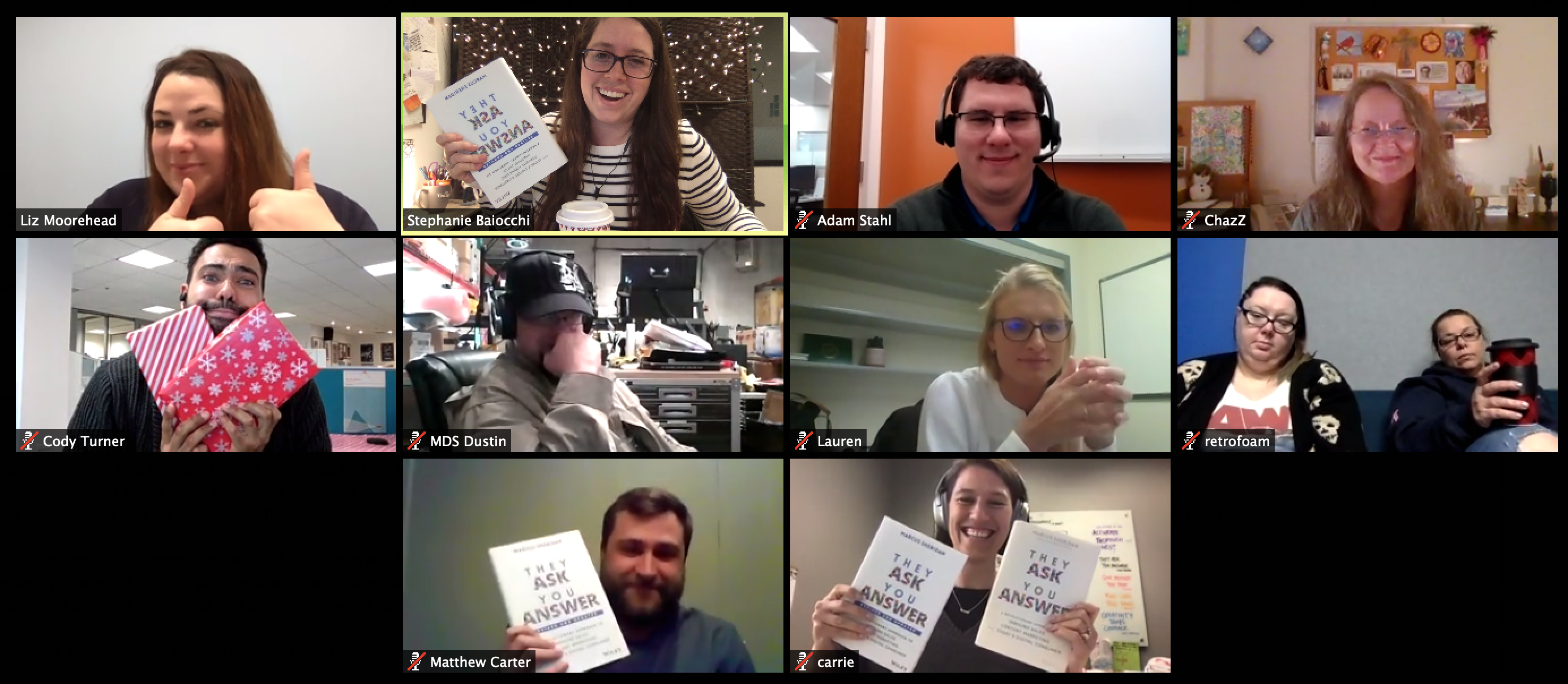Join 40,000+ sales and marketing pros who receive our weekly newsletter.
Get the most relevant, actionable digital sales and marketing insights you need to make smarter decisions faster... all in under five minutes.
"I've got 99 problems. You are all of them."
I said this out loud with a groan, as I face-planted into my desk and covered my head with my arms. I just couldn't bring myself to look at my content strategy spreadsheet anymore.
It was the middle of the night. I was in pajamas, which included a t-shirt that seemed a skosh out of touch with the mood of the moment. I was on my fourth cup of coffee, but I had forgotten to eat dinner. I was also genuinely considering the pros and cons of smashing my work-issued laptop with a hammer, as I grappled with the seemingly insurmountable task of organizing the mess in front of me.
It would still be a couple more years before I had enough experience under my belt to teach an actual course on how to create a digital marketing content strategy. So, at the time, I just felt overwhelmed.
Overwhelmed by all of the competing priorities I couldn't make sense of.
Overwhelmed by all of the different stakeholders, all of whom had "urgent" content needs that, in their eyes, should override all other requests.
Overwhelmed by the fact that I really wanted to go upstairs and make a sandwich, but I didn't know what kind of sandwich, and climbing the short set of steps seemed like a lot of work, and, like, why couldn't some magical wizard bring the sandwich to me?
And on, and on.
Content managers are often lone crusaders
Here's the thing about that scenario — I know I'm not the only content manager who has ever felt that way about a lot of the tasks we have to accomplish, day in and day out.
Even though content managers joining digital marketing teams has (thankfully!) become more mainstream, us professional word wranglers and brand storytellers often deal with challenges — like building a marketing content calendar that doesn't suck — that no one else in our organization can relate to.
I remember when I first started out as a content manger, that loneliness in the problem-solving arena for my job was crippling.
We didn't have virtual peer groups just for content managers, like the one I now lead for our IMPACT+ community:

We're so cute. We also have a lot of feelings.
So, I thought I would spend this article reaching out to my fellow content managers around the world who may be feeling a little bit adrift, by talking about some of most common problems you'll face, as well as a few of my favorite tips for solving them.
Now, let's get into it.
Problem #1: "People on my team keep saying they don't have the time to create content. They say they're too busy with their other duties"
Oof, this one is a doozy. Here's the thing, though. Most of the time when someone says this, it's not true.
In fact, lack of time here, isn't the issue.
As They Ask, You Answer author Marcus Sheridan likes to remind folks:
"People make time for things they see as valuable. So, when someone tells me they don't have time for something, what that really means is they don't see value in what I'm asking them to do."
So, how you solve for this problem primarily depends on why someone isn't seeing the value in content creation. (As I mentioned in a recent issue of THE LATEST, "Why?" is my favorite question.)
For example, is this a sweeping issue across the company where — from leadership on down to the front-lines — the vast majority of your colleagues struggle to see the value of the content you've been tasked to produce?
If so, that is a problem that needs to be solved from the top, with a focus on aligning your company on inbound as a way of doing business.
If, on the other hand, it's only pockets of teams or specific departments, you may be able to solve that challenge by spotlighting "content wins" publicly with your entire company.
At IMPACT, we do this during our weekly All Hands meetings. First, IMPACT Head of Editorial Ramona Sukhraj spotlights the top five performing articles (traffic) that were published in the previous week:

Each person (or group, if it was a collaboration) gets a slide, a round of applause, and a special shout out!
We also then do something called a content ROI spotlight, where I take the entire company through the lifecycle of a deal that recently closed. I explain how they got to our site and share every single piece of content they consumed, along with who authored each piece.
I then share how much that deal netted the company in revenue, and thank everyone who contributed a piece of content that led to the close of that deal since they did my favorite thing:
They created content that makes money. ❤️
People love being recognized for their efforts; it feels good and makes them look good. So, not only do these methods showcase the value of your content, it also makes people want to get involved so they can see their name in lights.
(Honestly, even if you're not experiencing this problem, I highly encourage you to put something like this in place at your company. The benefits of celebrating content wins on a regular basis as a company are immeasurable.)
Now, if it's your sales team who are the odd ones out and not seeing the value of content, then they need to be taught about assignment selling ASAP. Not only will it make them more likely to create content, they'll also probably want to get more involved in brainstorming topics, which will make your life so much easier.
Finally, the other root cause of this issue may be even more simple — you're dealing with someone with accountability issues. If you're dealing with an excuse machine, talk to their manager. Talk to your manager. You should have escalation procedures in place for when someone doesn't follow through or keeps shirking their content creation responsibilities.
Yes, it's really that simple.
Problem #2: "I can only edit so much in one day before my brain starts to feel like it's leaking out of my ears."
Ah, yes, a common affliction for many a content manager or strategist. This is what I like to call becoming "word drunk." Meaning your brain has consumed too many words to still function properly, so you need to lay off the word sauce.
I succumb to word drunkenness quite often, especially if there are massive pillar content pieces in front of me.
Here are the two most important things you need to know about the little editorial doom cloud that is being word drunk:
- I don't know who out there needs to hear this, but experiencing word drunkenness is not a sign that you're bad at your job. Mental fatigue is entirely natural given how taxing editing can be. So, cut yourself some slack.
- Do not try to ignore being word drunk. You can't simply focus harder or just push through it. There's no content manager equivalent of a "runner's high" waiting on the other side; you'll likely feel more giddy, but you'll just get worse at constructing sentences anyone will be able to understand.
So, what do you do? Take breaks when your brain tells you that you need a break. Your problem is really just your little grey cells crying out for help. Don't ignore them!
In most cases, taking a quick 15-minute break will solve the problem for me.
If it's really bad, however, I'll go for 30 minutes. Anything beyond that, it's usually clear that I've allowed to myself to approach short-term mental burn out, and I need to either call it a night or give myself a break by doing something else.
The only real way you screw up this problem is by refusing to address it. Getting word drunk is not something you can avoid, it's inevitable. The good news is that giving yourself a little mental space will 100% solve it.
Problem #3: "Interviewing subject matter experts for content isn't my strong suit, but I don't know how to get better at it."
I've got two pieces of good news for you on this front.
First, it gets easier with practice, I promise; the more you interview, the better you'll become. Second, IMPACT Editorial Content Manager John Becker has written about this exact topic, which is awesome for you, because the man is like a subject matter expert whisperer.
Seriously, he's a wizard when it comes to this stuff, so read these two articles:
- How to build rapport with any interview subject
- How to create content from a subject matter expert interview
And then go forth and practice!
Problem #4: "I spend so much time writing for other people that I forget how to create content in my own voice."
Welcome to my world. I deal with this all the time. Heck, I even struggled getting started on this very article.
And last year, when I was working on the second edition of They Ask, You Answer, it took weeks before I tamed the reflex to write like Marcus. (As many of you know, he has a very distinct style, as most do.)
This is a problem you don't really solve, so much as you accept it and push yourself through it by doing one simple thing:
Lead by example as a model content creator.
Seriously, the only way to keep in touch with your voice is to exercise it. Often. There's no tool, article, or secret weapon I can point you to that will help you. You have to put in the work.
It won't always be easy, though. Again, I know this from first-hand experience.
It's sometimes hard for me to get the ball rolling with my own content after spending tons of time writing and editing in the voices of others. Practicing my way through these mental blocks to find my own voice, however, has empowered me to take more risks and be more bold and memorable with my personality.
So, keep writing and keep making the time for your own writing. Inside and outside of the office.
For instance, a friend recently introduced me to writing poetry as an outlet.
(And by "introduced" I mean I was told to write a poem as part of a barter arrangement I almost immediately regretted agreeing to.)
Prior to that moment, writing poetry was something I had never, ever considered doing before. It seemed so foreign to me, and I assumed I would be bad at it.
A lyrical lady, I am not.
Now with about six chicken-scratched poems under my belt... I still wouldn't say I'm great. But the practice of writing poetry — a medium by its very nature that invites you to be more experimental and emotionally honest and instinctual — has made it easier for me to get in touch with my real voice, while also allowing me to process some emotions.
Because I'm oh, so deep.
I'm not saying you need to try and become the next Robert Frost in order to maintain your content manager edge.
All I'm saying is that you should find your own fun ways outside of the office to indulge your writing prowess and flex your storytelling muscles — whether that's through poetry, song-writing, satirical tweets, mystery novels via skywriting, or whatever.
Find what works for you.
Remember, you're not alone, so find your tribe
For all of you content mangers out there right now, know that there are scores of others just like you who are butting up against the same challenges.
You should count your blessings in that regard. As I've mentioned before, starting out as a content manager back in the day was tough, because the role (for the most part) didn't really exist except in a few fringe cases, including my own.
Also, yes. I did have to walk uphill both ways in the snow wearing newspapers for shoes whenever I wanted to write a blog article. Y'all whippersnappers have it easy! Now, get off my lawn!
So, if you do nothing else after reading this article, let it be this:
Go online, find people on LinkedIn through groups or your network, join a Facebook group for content strategists (there are plenty!), or check out a virtual peer groups for content managers, like the one I run on IMPACT+.
You can even put a message in a bottle and chuck it into the ocean, for all I care. Just go make an effort to find your people and then talk to them.
I can't tell you how helpful these types of cohorts are when you're trying to solve problems or, quite frankly, when you just need to vent to someone who actually understands exactly what you're going through.
Sometimes that's all you really need, right? Someone to listen.
Free Assessment:

